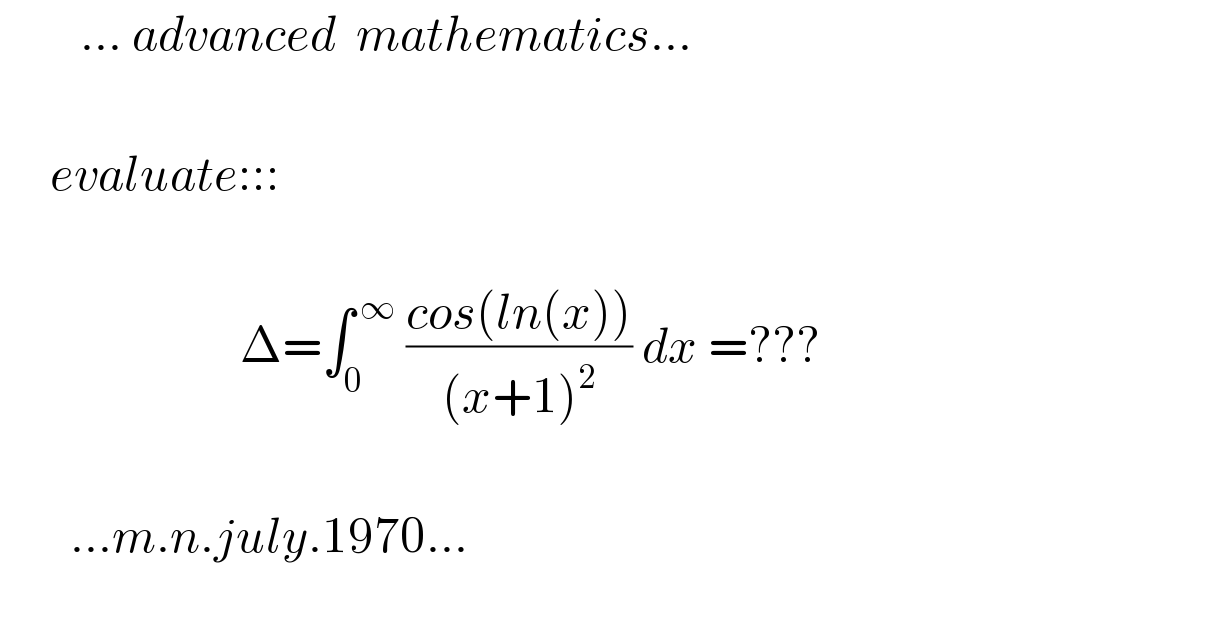
Question and Answers Forum
Question Number 115273 by mnjuly1970 last updated on 24/Sep/20

Answered by Bird last updated on 24/Sep/20
![A =∫_0 ^∞ ((cos(lnx))/((x+1)^2 ))dx⇒ A =∫_0 ^1 ((cos(lnx))/((x+1)^2 ))dx +∫_1 ^∞ ((cos(lnx))/((x+1)^2 ))dx but ∫_1 ^∞ ((cos(lnx))/((x+1)^2 ))dx=_(x=(1/t)) −∫_0 ^1 ((cos(lnt))/(((1/t)+1)^2 ))(−(dt/t^2 )) =∫_0 ^1 ((cos(lnx))/((x+1)^2 )) ⇒A =2∫_0 ^(1 ) ((cos(lnx))/((x+1)^2 ))dx we have (1/(x+1)) =Σ_(n=0) ^∞ (−1)^n x^n ⇒−(1/((x+1)^2 )) =Σ_(n=1) ^∞ (−1)^n nx^(n−1) ⇒(1/((x+1)^2 )) =Σ_(n=1) ^∞ (−1)^(n−1) nx^(n−1) =Σ_(n=0) ^∞ (−1)^n (n+1)x^(n ) ⇒ A =2∫_0 ^1 Σ_(n=0) ^∞ (−1)^n (n+1)x^n cos(lnx)dx =2 Σ_(n=0) ^∞ (−1)^n (n+1)∫_0 ^(1 ) x^n cos(lnx)dx U_n =∫_0 ^(1 ) x^n cos(lnx)dx =_(lnx=−t) −∫_0 ^∞ e^(−nt) cos(t)(−e^(−t) )dt =∫_0 ^∞ e^(−(n+1)t) cos(t)dt =Re(∫_0 ^∞ e^(−(n+1)t) e^(it) dt) but ∫_0 ^∞ e^((−(n+1)+i)t) dt =[(1/(−(n+1)+i)) e^((−(n+1)+i)t) ]_0 ^∞ =(1/(n+1−i)) =((n+1+i)/((n+1)^2 +1)) ⇒ U_n =((n+1)/((n+1)^2 +1)) ⇒ A =2Σ_(n=0) ^∞ (−1)^n (n+1)×((n+1)/((n+1)^2 +1)) =Σ_(n=0) ^∞ (−1)^n (((n+1)^2 )/((n+1)^2 +1)) =Σ_(n=1) ^∞ (−1)^(n−1) .(n^2 /(n^2 +1)) =Σ_(n=1) ^∞ (−1)^(n−1) (1−(1/(n^2 +1))) =Σ_(n=1) ^∞ (−1)^(n−1) (→diverges)+Σ_(n=1) ^∞ (((−1)^n )/(n^2 +1))(converges) perhsps this integral is divergent..!](Q115289.png)
Commented by mnjuly1970 last updated on 24/Sep/20

Commented by mnjuly1970 last updated on 24/Sep/20

Commented by Dwaipayan Shikari last updated on 24/Sep/20

Commented by Olaf last updated on 24/Sep/20
![U_n = ∫_0 ^1 x^n cos(lnx)dx = ∫_0 ^1 x^(n+1) ((cos(lnx))/x)dx U_n = [x^(n+1) sin(lnx)]_0 ^1 − ∫_0 ^1 (n+1)x^n sin(lnx)dx U_n = −(n+1) ∫_0 ^1 x^(n+1) ((sin(lnx))/x)dx U_n = −(n+1){ [−x^(n+1) cos(lnx)]_0 ^1 +(n+1)∫_0 ^1 x^n cos(lnx)dx} U_n = −(n+1)(−1+(n+1)U_n ) (1+(n+1)^2 )U_n = n+1 U_n = ((n+1)/((n+1)^2 +1)) maybe...](Q115299.png)
Commented by Bird last updated on 24/Sep/20

Commented by mnjuly1970 last updated on 24/Sep/20

Commented by mnjuly1970 last updated on 24/Sep/20

Commented by Bird last updated on 25/Sep/20

Answered by mnjuly1970 last updated on 24/Sep/20
![solution Δ =Re∫_0 ^( ∞) (e^(iln(x)) /((x+1)^2 ))dx=Re∫_0 ^( ∞) (x^i /((x+1)^2 ))dx =Re∫_0 ^( ∞) (x^((i+1)−1) /((x+1)^2 ))dx=Re(β(1+i , 1−i)) =Re((Γ(1+i)Γ(1−i))/(⟨Γ(2)=1⟩))= Re[iΓ(i)Γ(1−i)]=^(euler reflection formula) Re[i(π/(sin(iπ))] =Re[((2i(iπ))/(e^(i(iπ)) −e^(−i(iπ)) ))]=((−2π)/(e^(−π) −e^π )) =(π/((e^π −e^(−π) )/2))=(π/(sinh(π))) ✓ m.n.july. 1970](Q115304.png)
